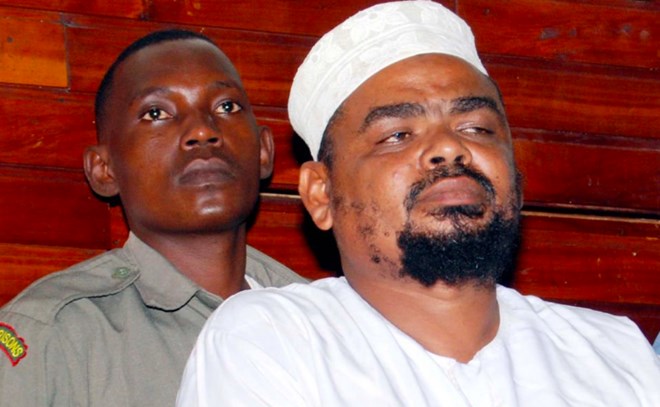
Sunday September 6, 2020

The Mombasa-Malindi highway was unusually clear. Vehicular traffic on both sides of the Kikambala stretch had been stopped, in a meticulous plan that would be followed through with clinical – nay, military – precision.
The trap thus set, the shadowy killers, believed to have been security agents, lay in wait for Sheikh Aboud Rogo to fall right into their cross-hairs. And fall into the trap he did.
The fiery cleric who was suspected to have been radicalising the youth on the Kenyan coast and recruiting them into the Somalia-based al-Shabaab was, minutes later, driving to his Kikambala home in the company of his family.
A few metres from Bamburi police station, his van was sprayed with bullets and, in a matter of seconds, the target’s lifeless body was flumped on the steering wheel of his vehicle.
To his killers, the Standard Seven dropout who had given them headache for years on end was no more.
A month before he met his death, Sheikh Rogo had been placed on US sanctions for “engaging in acts that directly or indirectly threaten the peace, security or stability of Somalia", specifically for recruiting and fundraising for the hardline radical youths.
It is for this reason that the Kenyan government, which is reported to have had a hand in his assassination, must have breathed a sigh of relief as the “problem” had been solved. Except that it had not.
Immediately after his killing on August 27, 2012, chaos erupted at the Masjid Musa mosque deep in Majengo, Mombasa County. Clearly, the security agencies had misread the kind of influence the extremist preacher had on his followers.
In his preaching, Sheikh Rogo would keep saying: “I know they will kill me, but they will not be able to kill all of us who are in here. Da'awa will continue even if Sheikh Rogo is killed.”
And true to his word, eight years since he was killed, hundreds of youths he is believed to have recruited are reported to have joined terror groups across the globe.
Following frequent raids by the police, hundreds of these youths were reported to have fled the Kenyan coast to different places, including Somalia. Others crossed to Tanzania and reportedly built a presence in Kibiti in 2015, as yet others sneaked to Mozambique through Tanzania.
In the recent past, these radicals staged a series of attacks in Mozambique, where they now operate under the identity of Ansar Al Sunnah.
Two weeks ago, the insurgents were reported to have captured the port of Mocimboa da Praia in Cabo Delgado, Mozambique.
The attack happened at a strategic site for gas companies operating in the resource-rich region, according to international media reports.
A number of oil and gas firms such as ExxonMobil and Total are among those whose business projects were disrupted by the attacks. These attacks are, however, not entirely new.
In March this year, a Mozambique media outlet reported that the militants launched an attack in Mocimboa da Praia, where they allegedly took over a military base and raised their flag.
The attacks by the terrorists linked to the Islamic State – and referred to as Al Shabaab in the area – are reported to have killed hundreds and displaced many in Cabo Delgado.
Reports indicate that there has been a significant increase in the number of attacks in the Northern Province, with the vast majority attributed to Ahlu Sunnah Wal Jamaah (ASWJ), known locally as al-Shabaab.
An analysis of the deteriorating security situation in Mozambique by Tony Blair Institute’s Global Extremism Monitor (GEM) states that the Ansar al-Sunna was involved in nearly 70 percent of all violent activities in Mozambique since 2018, gradually intensifying their campaign as each quarter passed.
Another report dubbed Islamic Radicalisation in Northern Mozambique, The Case of Mocímboa da Praia, written by Saide Habibe, Salvador Forquilha and João Pereira, states that Ansar al-Sunna started out as a religious organisation in 2015 in the northern Mozambican port town of Mocimboa da Praia.
It adds that the group, which initially called itself Ahl al-Sunna wa al-Jamaa, was founded by a group of young men who had studied in Islamic schools in Somalia or had links with Salafi groups in Tanzania and Kenya.
“Ahl al-Sunna wa al-Jamaa’s narrative hardened as sectarian tensions escalated and the group fell into a dispute with authorities over its radical interpretations of Islam and characterisation of Sufi Muslims.
“These exclusivist views crystallised further when the group incorporated the followers of Aboud Rogo Mohammed, the leader of al-Hijra, a Kenyan group allied to the al-Shabaab in Somalia,” reads the report published in 2019.
Heighten efforts
Authorities in Mozambique have continued to heighten efforts to deal with the insurgency that is threatening their investments in key installations.
In Kenya, police have focused their anti-terror war on Kwale, where intelligence reports indicate a majority of Rogo’s followers sought refuge and reportedly turned the South Coast into a recruitment zone for Al-Shabaab.
Police reports showed there were active terror cells in Bongwe, Mwaluvamba, Mbita, Shamu, Kilolapwa and parts of Ng’ombeni, which borders Mombasa and Kwale counties.
Reports indicate most of the youths who attended the sessions at the Masjid Musa were from Kwale.
In a previous interview, Hassan Mwakimako, an associate Professor of Islamic Studies at the Department of Philosophy and Religious Studies at Pwani University, attributed the shift of terror activities to Kwale to the killings of the Mombasa clerics.